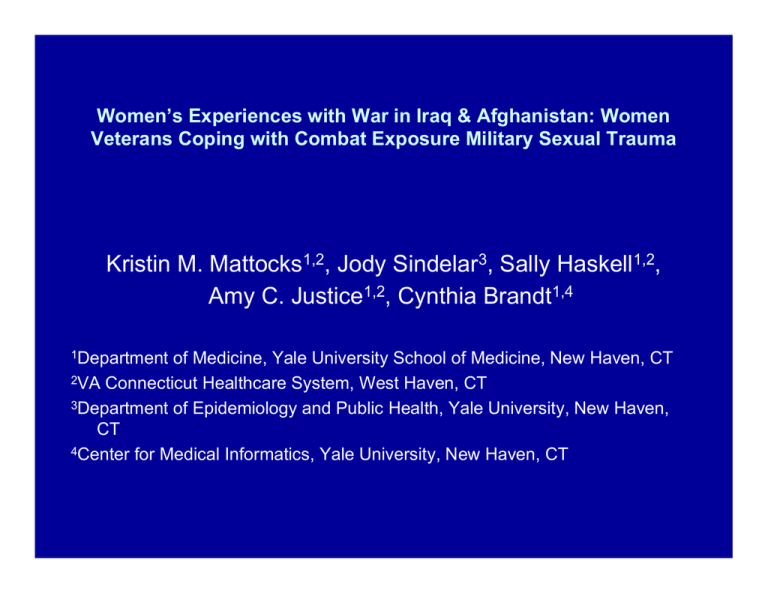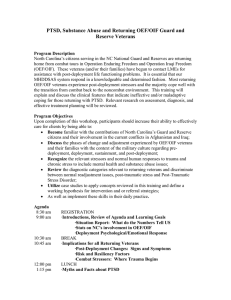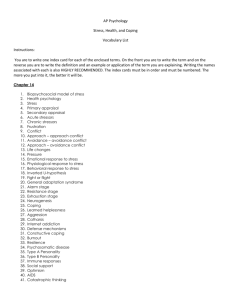Women’s Experiences with War in Iraq & Afghanistan: Women
advertisement

Women’s Experiences with War in Iraq & Afghanistan: Women Veterans Coping with Combat Exposure Military Sexual Trauma Kristin M. Mattocks1,2, Jody Sindelar3, Sally Haskell1,2, Amy C. Justice1,2, Cynthia Brandt1,4 1Department of Medicine, Yale University School of Medicine, New Haven, CT 2VA Connecticut Healthcare System, West Haven, CT 3Department of Epidemiology and Public Health, Yale University, New Haven, CT 4Center for Medical Informatics, Yale University, New Haven, CT Background: US Global War on Terrorism (GWOT) • Includes Operations Enduring Freedom (OEF) and Iraqi Freedom (OIF) • Over 1.7 million American troops have served in OEF and/or OIF. • 837,458 veterans have left active duty and become eligible for VA healthcare since FY 2002 OEF-OIF Women • Changing demographics of military – 15% of active duty – 17% of Guard/Reserves – 20% of new recruits • Over 170,000 women soldiers deployed to Iraq and/or Afghanistan – Many experience multiple deployments » Gulf war women: 41,000 » Vietnam: 7,000 Women’s War-Time Experiences • Women excluded from serving in direct combat specialties (infantry or armor), but serve in a variety of support positions that place them at risk. – Among 4243 US casualties in Iraq, 109 have been among women. • 61% of women’s deaths ‘hostile’ (IED, mortar attack, small arms fire). • Remaining deaths from injury/illness, accidents, suicides. Post-Deployment Coping Mechanisms • Literature and popular press emphasize men’s wartime experiences and stressrelated coping mechanisms: – Substance abuse – Violence (domestic violence, interpersonal violence) – Self-injury/suicide • Very little is known about women veterans’ experiences with war, societal re-entry and coping with post-war stress. Research Questions • What are women’s experiences with war in Iraq and Afghanistan? • What types of post-deployment stressors do OEF/OIF women face? • What kinds of stress-related coping mechanisms do women employ upon return to the US? Methods: Sample and Design • Women Veterans Cohort Study – Phase I: Administrative cohort of OEF/OIF veterans enrolled in VA (n=452,405) • OEF/OIF roster provided by DOD Defense Manpower Data Center – Those with military discharges from 10/1/200104/30/2008. – Veterans must have enrolled for VA services to be included on roster. – Phase 2: Observational cohort of consented patients in CT and IN (n=500/site) Methods: Focus groups/interviews • Invited consented OEF/OIF women veterans from CT to participate in focus groups (individual interviews if could not attend focus group). • Participants asked questions regarding: – Wartime experiences – Societal re-integration – Stress-related coping mechanisms • Focus groups/interviews transcribed and analyzed using constant comparative method of qualitative analysis. Results • Five focus groups (25 women) – Age range: 23-58 (mean age: 42) – 64% White, 20% Hispanic, 16% Black – Education: • 40% high school diploma • 20% college degree • 40% graduate degree – Type of Service: • 40% Reserves (Army, Navy) • 50% National Guard (Army, Air Force) • 10% Active Duty (Air Force) Major Findings • Deployment Stressors – Mission-Related Stressors – Interpersonal Stressors • Post-Deployment Stressors • Stress-Associated Coping Mechanisms Mission-Related Stressors – Combat Experiences – Gender Expectations for Women – Difficult Living/Working Environment Mission-Related Stressors (Combat Experiences) “I had the unfortunate experience of having to kill a child, an Iraqi child. Our convoy had broken down and this kid came running for us, he wouldn’t stop and he was wired and it was me and my battle buddy or the kid and they were using kids as bait, so it was the kid that was going.” Mission-Related Stressors (Gender Expectations for Women) • “Women definitely have to do twice the work, twice as hard, and twice as often, in order to be viewed the same. There’s an expectation that we cannot meet the same standards as our male counterparts.” Mission-Related Stressors (Difficult living/working environment) • “We were some of the first women over there, so they didn’t really want us mingling with the men too much when we weren’t working because of the potential trouble. So, instead of sleeping in the big bay with everybody else, they made us sleep in an old supply closet. Let me tell you, it was awful. It was like 140 degrees in there. There was no air to breathe, and the smell was terrible.” Interpersonal Stressors – Military Sexual Trauma – Gender-Specific Health Issues – Leaving Children Behind Military Sexual Trauma • “One of the problems in Iraq for female veterans is that there’s a lot of sexual harassment, and rape is a problem. It doesn’t matter if you’re 18 or 55…if you’re there, its gonna happen to you.” Military Sexual Trauma • “There are so many women that are having (MST) problems and they’re afraid to report it because of the repercussions. (Women) don’t have to be worried about enemy fire…they have to worry about the guy working next to them, you know, that’s supposed to be protecting them and taking care of them. He becomes Public Enemy #1”. Gender-Specific Health Issues • “One of the big concerns for a lot of our ladies was…we all had to get pap smears before we went through mobilization. I remember almost half of our young ladies had some kind of HPV-positive screen and were supposed to be getting 6-month paps, but we couldn’t get them there. A lot of the young ladies were like “I’ve got to have a pap smear, I’ve got to get checked out. I don’t want cervical cancer”. Leaving children behind • “My children were 3, 6 and 10 when I left for Iraq for a year and a half. I had to separate my feelings for them, because I had a job to do. I would call but I would not ask them too much about what was going on in their lives because I had to create a distance between us. It was hard, but I had a job to do and I couldn’t do it if I was worrying about them.” Leaving children behind • “I left for Iraq when my daughter was only 4 months old. I wasn’t that into being a mother yet, so it wasn’t hard, and I knew my mom would take good care of her when I was gone.” Post-Deployment Stressors – Dealing with the aftermath of war – Re-integration with family/friends – Employment re-integration – Stigma Living with the aftermath of war “I went to the race last weekend in Dover and here I am sitting in this big racetrack with thousands of people and I’m thinking to myself this would be a perfect thing to blow up. You know and my husband sitting here going what is wrong with you? And I said you know this would be a good terrorist target, and he says will you just shut up!” Living with the aftermath of war • “…but you know carcasses, the dead deer on the side of the road still irks me, still freaks me out, and I’m like ‘I’m coming into that lane buddy’ because I’m not even trying to drive by this thing cause God knows if it’s going to blow up…” Family Integration/Disruption • “I returned from Iraq in March, and had abdominal surgery just eight weeks later. The day after I got out of the hospital, my husband died suddenly of a pulmonary embolism. He had taken care of our three children for the whole year and a half I was in Iraq, and I had no time to get to know him again as my husband. Now he’s dead and I’m lost.” Re-integration with friends “My friends really didn’t understand. I don’t talk to a lot of them anymore only for the fact was I think when I went away in their minds it was almost like ‘well she’s not talking to me anymore so I’m not going to talk to her’ . So we lost communications while I was over there and I took it as ‘well if you don’t want to talk to me while I’m getting shot at and in a combat zone, I don’t want to be your friend’.” Friendships “(Talking about) treating people that have been blown up and all that, is not that relatable of an experience to most people you meet in Connecticut.” Employment Problems “(After Iraq) I kept on quitting my jobs and you know (I had) violent attacks of anger and you know I’m just screw you and the horse you came in on, I’m quitting, you quit in a second and you’re like okay now what do I do to pay the bills?” Stigma as a woman/mother soldier • “It wasn’t easy for my husband (when I went to Iraq). He wanted to trade places with me. All of our friends thought that since he was the man, he should be out fighting wars and I should be home taking care of the children. Some people I know seemed angry because I left my children for a year, even though their father was the one caring for them.” Stress-Related Coping Mechanisms – Overeating/Isolation – Exercise – Excessive spending Stress-Related Coping Mechanisms: Overeating “When the depression hits I just go to the grocery store and I go when there’s no crowds, I go when it’s supposed to open cause I don’t like crowds. But I buy whatever I want to and then I sit on the couch and eat chocolate. I buy enough to last me the week.” Stress-Related Coping: Overeating and Isolation “I put on about twenty pounds when I came back. But I think mostly it’s cause I would isolate myself. You know, I don’t want to be around people, I don’t want to hear the stupid stuff they’re talking about, you know? I would eat and then I would just isolate myself. ” Stress-Related Coping: Shopping/Gambling • “My thing is I like to go to the casino by myself. I can be there for eight hours by myself and I don’t hear anyone, I’m anonymous, no one knows who I am, I’m just another person playing a slot machine. I can go shopping, I like to go shopping by myself, but I have no concept of the money I spend…I’m really into the instant gratification.” Stress-Related Coping Mechanisms: Exercise “You know they always taught us to exercise. So I would like exercise to excess and really to excess to the point where I would be sick. Exercise was my addiction and I was constantly throwing up. I don’t know what that was about…I got super skinny.” Conclusions • Women experience significant war and post-deployment stress – Combat experiences – Gender expectations – Military sexual trauma – Gender-specific health concerns – Re-integrating with family and friends – Employment Conclusions • Women use a variety of stress-related coping mechanisms: – Overeating/Isolation – Exercise – Excessive spending • No mention of substance abuse or violence to date. • Women veterans display incredible resilience and dedication to their country. Research and Policy Implications • The VA must continue to tailor its services to the needs of women veterans, who experience significant war and post-deployment stress. • More research is needed to investigate the impact of military and post-deployment stress on women’s health. • VA should collaborate with state agencies (Departments of Public Health, Departments of Veterans Affairs) to ensure women veterans are receiving needed health services. Final Thought “I really think it’s important as women veterans to share our experiences. I think we generally learn a lot from each other in conversation and have great experience and knowledge to share, so I for one am more than willing and really would love to see there be more follow up and more connection between us.”


